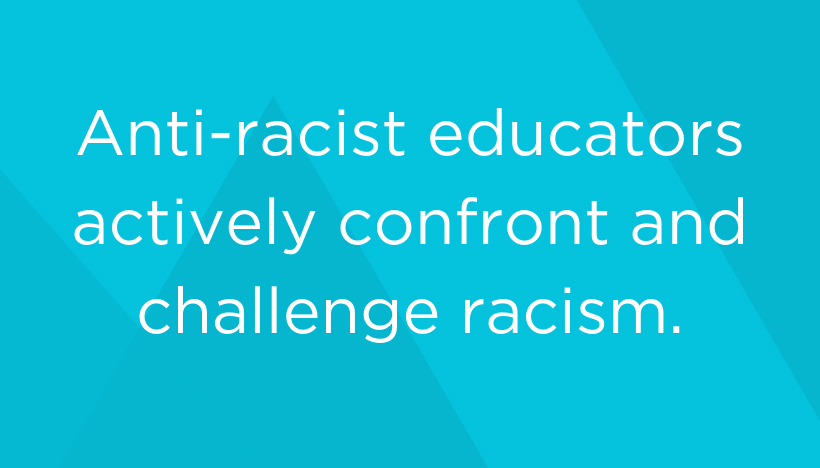From the NCTE Committee Against Racism and Bias in the Teaching of English
This post was written by NCTE members Keisha Rembert, Patrick Harris, and Felicia Hamilton, members of the NCTE Committee Against Racism and Bias in the Teaching of English.
The Committee Against Racism and Bias in the Teaching of English has produced a series of educational videos for teachers in order to motivate us all to anti-racist teaching. Join us as we push toward righting wrongs and engaging students in necessary conversations.
Being an antiracist educator is a verb.
As our nation seems to grapple with acts of hatred more frequently, we, as educators, must consider our actions. We need to consider where we’ve spoken and where we’ve been silent in terms of quelling the growing violence our country faces. These perpetrators were once students. Our teaching must therefore be an act that addresses, challenges and dismantles racism in all its forms.
Anti-racist educators actively confront and challenge racism.
Our classrooms must become the proving ground of discourse on race in America. We must:
1. Bring the realities of the present day into the classroom. The rise of white supremacy should be discussed with students. You can do this by:
- incorporating current events into your units or book studies.
- making connections between characters and current events.
- finding parallels between book plots and current events
2. Use all texts strategically to give students opportunities to talk about systemic inequities. You can do this by:
- identifying texts that point to larger systemic injustices or problems.
- finding nonfiction texts that students can use to study and learn about the issue before entering a discussion.
3. Create projects that encourage student activism. You can do this by:
- offering projects in which students can do local activism work.
- allowing students choice in how they are assessed.
- seeking out local and/or national issues and granting students opportunities to address them in your class.
Our students are traumatized by the acts of racism they experience and see on a daily basis.
As teachers, we must show our students that we are on the frontlines for and with them. We cannot ignore the outside world but rather must embrace opportunities for students to bring their concerns into our classroom, providing a place of safety and prompting advocacy.
Teaching is not apolitical. Antiracist educators must make discussions of racism and bias an everyday practice.
Our students are speaking up and speaking out. They are poised and ready to take action.
Our schools need to catch up. Our curricula and instruction need to catch up. Antiracist teachers effect change through action. Find like-minded teachers and work together to bring about change. Our nation needs it. Our students deserve it. You can do it.
Video Citations
“Cops accused of racist social media posts.” YouTube, ABC News, 21 June 2019.
“NJ high school wrestler forced to cut dreadlocks.” YouTube, ABC News, 21 December 2018,
Horton, Alex. “After Parkland killings, Broward County vowed to police aggressively. Then a deputy punched a teen.” The Washington Post, 23 April 2019.
“The Migrants Trapped Below An Overpass In El Paso (HBO).” YouTube, VICE News, 30 March 2019.
“11-Year-Old Naomi Wadler’s Speech At The March For Our Lives (Full).” YouTube, NBC News, 24 March 2018.

Keisha Rembert is a passionate learner who is social justice and equity focused always. She taught middle school ELA and US History for 17 years and now teaches preservice teachers in hopes of changing our world one student, one teacher at a time.

Patrick Harris is a middle school English teacher in Detroit, Michigan. He is the recipient of the 2016 NCTE Early Career Educator of Color Leadership Award and is founder of Good Trouble Media where hosts podcasts that amplify teacher experiences in education.

Felicia Hamilton is an English teacher at Windsor High School in Windsor, Connecticut.

